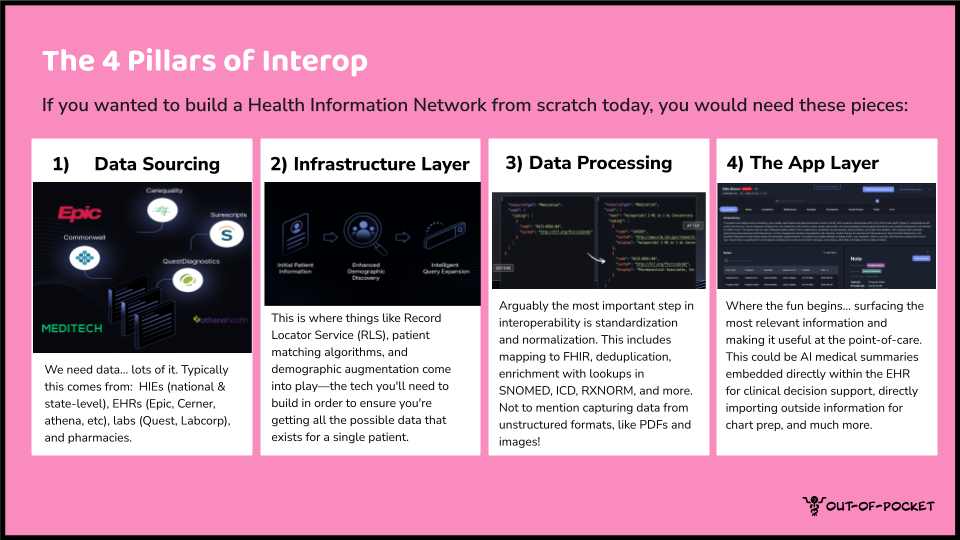Network Effects: Interoperability 101
.gif)
Things You'll Get From This Course
The “Holy Grail”
The Mechanics
Real World Examples
Why Now?

Meet Your Instructors, Dima Goncharov and Colin Elsinga

Dima Goncharov
Dima Goncharov is the Co-Founder and CEO of Metriport, an open-source platform transforming healthcare data exchange. With a background as a software engineer, Dima has built everything from aerospace and defense mission systems to highly available cloud database services at Amazon Web Services (AWS). Prior to launching Metriport in 2021, he worked on Amazon Aurora, contributing to its reputation as a reliable and performant database platform. Dima’s passion for transparent, secure, and accessible health data solutions is evident in Metriport’s mission and the APIs they’ve developed for seamless medical record retrieval. Dima holds a Diploma of Technology in Computer Systems Technology from the British Columbia Institute of Technology and is an alumnus of Y Combinator’s S22 cohort. Now based in San Francisco, he leads Metriport’s efforts to modernize and open up healthcare interoperability for providers everywhere.
.png)
Colin Elsinga
Colin Elsinga is the Co-Founder and COO of Metriport, an open-source healthcare data interoperability platform. A software engineer by training, Colin brings hands-on experience developing consumer health apps and previously worked for an online health retailer in Vancouver. Driven by a vision to simplify and modernize healthcare record access for providers and patients, he leads the operational direction and product strategy at Metriport. Colin and his long-time friend Dima Goncharov whom he met in middle school nearly 20 years ago & joined forces in late 2021, leaving their engineering roles to collaborate on Metriport’s landmark solutions. Colin is also an alumnus of Y Combinator’s S22 batch and is based in San Francisco, building state-of-the-art APIs and open-source tools that empower healthcare organizations to deliver timely, effective care with instant access to comprehensive patient medical histories.

Course Syllabus & Schedule
Module 1
Day 1
The “Holy Grail”
Module 2
Day 2
The 4 Pillars of Interoperability
Module 3
Day 3
Healthcare’s Internet 2.0
Module 4
Day 4
Module 5
Day 5
Module 6
Day 6
Module 7
Day 7
Module 8
Day 8
Module 9
Day 9
Module 10
Day 10
Frequently Asked Questions
Who is this course for?

Have you ever wondered how your PCP gets your medical records from your specialist, or how your latest lab results show up in Epic when you visit the ER?
This course isn’t just designed for beginners looking to better understand interoperability in healthcare—it’s also meant for:
- Healthcare experts who are looking for a deep dive into the technology that makes nationwide healthcare data exchange possible.
- Engineers and data scientists looking to get up to speed with concepts like FHIR, TEFCA, and RLS.
- Clinicians and Ops folks looking to improve efficiency with care delivery.
- Entrepreneurs trying to build the next big thing in healthcare.
How much is it?

The full three-session course is free of charge!
Do I have to be at every session? How long are they?

Each of the three sessions is 90 minutes and includes live interaction with industry experts. We highly recommend attending live to get the most out of the discussions, but don’t worry all sessions are recorded and available to watch on-demand if you can’t make it in real time.
Will I be an expert in interoperability after finishing this course?

Nope, but you will probably understand interoperability on a more technical level than 99% of your peers.
Will you know everything there is to know about FHIR, or the future of Carequality? Probably not. But you will know what a RLS does, why standardization and normalization is fundamental to interoperability, and how to design a health information network at scale.
The idea of this course is for you to walk away with enough interop knowledge to be dangerous.
Is there a lot of work?

You'll get as much as you put into it. There's pre-reading and supplemental reading if you want to go deep in any area. There's lightweight optional assignments that should be a paragraph or two and meant to solidify what you've learned and create discussions in the Slack.
You could just sit back and listen to the lectures, but I think you'll get more out of it if you do some of the extra work.
I have another question not answered here

Email founders@metriport.com and we’ll get back to you ASAP.







.png)

.png)
.png)

.png)
